There’s a new self-driving trucks startup in town. And the faces are familiar.
Bryan Salesky, Peter Rander and Brett Browning — the trio behind the now defunct Ford and VW-backed autonomous vehicle startup Argo AI — have formed a new company called Stack AV that’s focused on commercializing self-driving trucks. SoftBank Group is the sole investor in the endeavor.
SoftBank Group didn’t disclose the financial terms of the investment except to say it is providing Stack AV with “capital, resources, and deep expertise in AI to help accelerate its growth and technological developments.” SoftBank Group is also on the Stack AV board. Bloomberg reported that SoftBank Group invested $1 billion.
It should be noted that the investment is coming from SoftBank Group, not the SoftBank Vision Fund, which invested in several AV companies, including Aurora, Cruise, Didi Autonomous, Nuro and Robotic Research. GM bought in 2022 SoftBank Vision Fund’s stake in Cruise for $2.1 billion.
The launch of Stack AV and its considerable backing is a stunning turnaround for the former Argo AI founders. Just 11 months ago, Argo AI was forced to shut down after Ford and VW pulled their support. The abrupt closure was shocking to many who considered Argo one of the leaders in the AV industry. It also illustrated a shift among some automakers — desperate to find new sources of revenue — away from autonomous vehicle technology and toward trying to monetize advanced driver assistance systems that are found in today’s modern cars, trucks and SUVs.
Salesky, who is CEO of Stack AV, told TechCrunch he and his fellow co-founders took a little time off after Argo shuttered. But he was soon back and thinking about how to commercialize autonomous vehicle technology.
“We had a number of discussions in the early stages and realized pretty quickly that we were aligned in terms of what a good entry point would be for autonomous vehicles in the trucking use case,” he said in an interview Thursday. “And we also recognized the huge lift that a backer like SoftBank would give us to be able to not just build the technology, but to also be able to scale out the business. None of these businesses will be successful if we can’t scale them out.”
For now, Salesky along with Rander, who is president, and Browning, who is chief technology officer, are focused on hiring and getting test vehicles on the road. Stack AV employs 150 people across its Pittsburgh headquarters and 15 states via remote work. Stack AV has tested its technology in trucks, according to Salesky. The trucks have a human safety operator behind the wheel and, for now, are mostly being used for data collection.
Salesky and Kentaro Matsui, head of the new business office at SoftBank Group and managing partner at SoftBank Investment Advisers, are clearly bullish on self-driving trucks and more broadly, AI. “The next decade will be defined by AI, where all social systems will be linked by this technology to solve the most complex societal issues,” Matsui said in a statement. “By applying the strengths of AI-powered technology to the trucking industry, Stack AV will fundamentally change the transportation of goods and supply chains across the globe.”
That doesn’t mean it will be easy, however. A number of companies that were trying to commercialize self-driving trucks have folded, including Embark. TuSimple, once considered a leader in this specific use case, has been plagued by internal drama and may sell its U.S. business and shift its resources to China. Waymo recently shut down its trucking program to focus on robotaxis. Today, privately held Kodiak Robotics and publicly traded Aurora are the two main contenders applying AV technology to Class 8 trucks.
Salesky said despite the consolidation in the sector, he’s confident that Stack AV will be successful because of their experience and SoftBank Group’s involvement.
“We have a really experienced team that I think can see around the corners of what works and what doesn’t both in the business model and in various tech approaches,” he told TechCrunch. “I think if you look at the companies that do still exist on the playing field, they have experienced teams, right? We have an experienced team and we also have a backer that is all in on all things related to AI. They believe that AI is the forefront of a revolution and changing all sorts of businesses. It will change them for the better, it will create new businesses, new industries and ultimately will propel humanity forward. And self driving is one of those applications where it has the ability to truly make lives better, and that’s what we’re all that’s what we’re all behind right now.”
